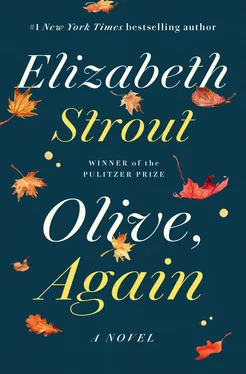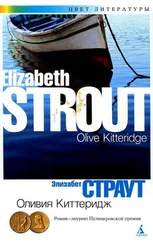Jim looked at the road in front of him. “Okay,” he said.
Helen became tired as they went down the street and stopped at every display of art. Booth after booth of white canvas sporting a variety of artwork: watercolors and oil paintings. Helen thought it all terribly amateurish—many of the paintings were of the sea, and also white clapboard houses, the corners of them, often with a rosebush painted in. “Look at all this,” she said to Margaret. “It’s lovely!”
Margaret said that it was.
It kept bothering Helen, the way Margaret looked. She had forgotten that Margaret had such large breasts. They seemed positively huge to Helen, and Margaret wore a long loose dress of dark blue and they still poured forth beneath it. And her hair! Why would anyone wear her hair in such a way? Just chopped off like that. Oh dear, Helen thought, glancing at Margaret through her sunglasses. Oh, Bobby, what a change you made! Pam had been very stylish—if not a little overdone, in Helen’s view—but Bob had now lived with this other wife for almost a decade. Well. What could you do about it? Nothing.
“Hey, hi there,” said a woman to Margaret, and Margaret said, “Well, hello.” And she stopped and talked to the woman, who seemed about Margaret’s age, who even had hair not unlike Margaret’s, they chatted about the woman’s sister, how she was doing much better, and then Margaret said, “Oh, this is my sister-in-law, Helen,” and Helen stuck out her hand and the woman seemed surprised, and she shook it, and then they walked their separate ways. This happened a number of times: people stopping Margaret to talk. They all seemed glad to see her. Margaret asked about their kids, and jobs, and someone’s mother, but she didn’t say again “This is my sister-in-law, Helen,” and Helen just stood there trying to look interested. So at one point, when Margaret was talking to a man, Helen said, “Hi, I’m Helen, I’m Margaret’s sister-in-law,” and she stuck her hand out, and the man—it was a big man this time that Margaret was talking to—brought his hand out of his pocket to shake Helen’s hand with little vigor.
“You’re very popular,” Helen said to Margaret as they continued down the street, and Margaret said, “I’m a minister. When we moved here a few years ago, I was lucky to get a part-time job with the UU church.”
“The what church?” asked Helen.
“Unitarian,” said Margaret.
And Helen said, after a moment, “Well, you’re still popular.” Margaret looked at Helen through her sunglasses and laughed, and so Helen laughed as well. They were moving past a café that had its doors open. Helen stopped and brought out a straw hat from her bag, the hat could be rolled up, and now she unrolled it and put it on her head.
“You look like a tourist,” Margaret said to her, and Helen said, “Well, I am a tourist.”
Another man walked by, he had a gray beard, and Helen saw that he was wearing a skirt. Helen looked away, then looked back at him. It was a kilt, she realized, though it didn’t seem as long as a kilt usually was. It was brown, and the man wore a gray T-shirt and brown walking shoes. “Hello, Fergie,” said Margaret, and the man said, “Hello, Margaret.”
When they were past him, Helen said, “Why was he wearing that?”
“I guess he likes it,” Margaret said.
“I’ve lived in New York for fifty years, and I have never seen a man walking down the street in a skirt,” said Helen. “A kilt,” she added. Margaret turned her sunglasses toward Helen, and Helen said, raising a finger, “Whoops, that’s not true. There used to be a man who went jogging on Third Avenue in a black negligee. Which is still not a skirt.”
“Well, I guess you win,” said Margaret. “Far as I know we have no men jogging about in black negligees.”
“He was old, too. The man in the black negligee,” Helen said.
Margaret kept walking.
“It was kind of weird,” Helen said. “You know.”
And Margaret didn’t say anything; she just stopped at the next booth of art.
Helen was becoming hot, even with her hat stopping the sun from hitting her straight on her head, and she said to Margaret as she stepped up behind her, “I didn’t know it got so warm in Maine.”
Margaret said, “Well, it does.”
And then Helen decided she would buy a piece of art. That’s what she decided to do so that Margaret wouldn’t think she was a snob, because maybe Margaret was thinking that Helen was a snob. “Hold on,” she said, touching Margaret lightly on the arm. “Let me look at these paintings.” They were seascapes, a lot of purple waves and foaming spray. Helen found one, a smaller piece stuck up high on the white canvas: It was a painting of a rock with water swirling around it. “Oh, I’ll take that,” Helen said, and she brought out her credit card and the fellow seemed very pleased to sell it to her. “I’ll just take it, no need to wrap it in anything,” Helen said, because the fellow was ready to put it in brown wrapping paper.
As Helen took the painting and turned to go, she bumped into a tall big old woman who was saying loudly to the man she was with, “God, have I seen enough of this crap! Come on, Jack.”
Margaret said, “Oh, hello, Olive.”
The woman looked surprised and she said, “Hello, Margaret.” Then she looked Helen up and down through her sunglasses; Helen could see the woman’s head move slightly as she took Helen in. “Who are you?” the woman asked.
“I’m Margaret’s sister-in-law,” Helen said, and the woman kept looking at her and Helen added, “My husband is Bob’s brother, and we came up from New York to drop our grandson off at camp.”
The woman said, “Well.” She pointed a finger at the painting Helen held. “You enjoy that,” and she turned around, waving a hand over her head as she and the man walked past the two of them.
“She’s got me all stuffed up on antidepressants,” Jim was saying. He shrugged, and gave his lopsided grin to his brother and sister. “What can I do?”
“Are you depressed, Jimmy?” Susan sat down at the kitchen table across from her brother. Susan was an optometrist, and she had taken the afternoon off to be with both of them. Sunlight fell through the window, making a square on the table and across Susan’s arm.
“Well, not now.” And Jim laughed.
Susan and Bob did not laugh, and Susan said, “But were you before?”
Jim placed his hands together on the table and looked off to the side. “I don’t know.” He looked around the kitchen some more; it was a small kitchen, but Susan’s house was a small house. There were orange curtains at the kitchen windows, one was just slightly lifting in the breeze from the open window; the room was warm. “But she seems to think I’m easier to live with when I’m on them, so—I am. On them.” Jim looked at Bob and smiled. “Maximum dose, so I don’t drink. Which is okay. But I’ll tell you, Helen’s taken up the sauce. She enjoys her nightly wine, I have noticed that.”
Susan glanced at Bob, and they both said nothing for a few moments. Then Susan said, “But you’re okay, though. Right?”
“Sure,” Jim said, looking from one to the other. To Bob it seemed as though he was looking at Jim through a pane of glass; he understood now what was different about Jim. His edge was gone. It’s not that he had mellowed, it’s that he was medicated. Bob felt a slight tightening of his chest, and he sat up straight.
Читать дальше













